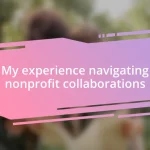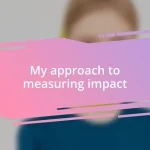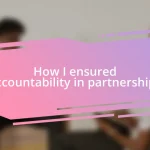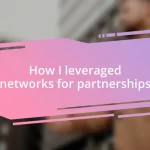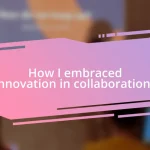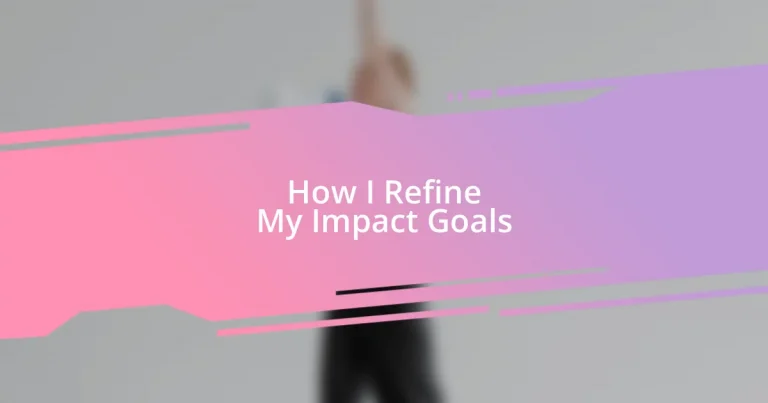Key takeaways:
- Identifying impact goals aligns actions with personal values, providing clarity and purpose.
- Setting SMART goals transforms vague objectives into clear, actionable plans, enhancing accountability.
- Creating an action plan breaks down goals into manageable tasks, ensuring steady progress and motivation.
- Regular reflection on achievements and setbacks informs future goals and strengthens community engagement.
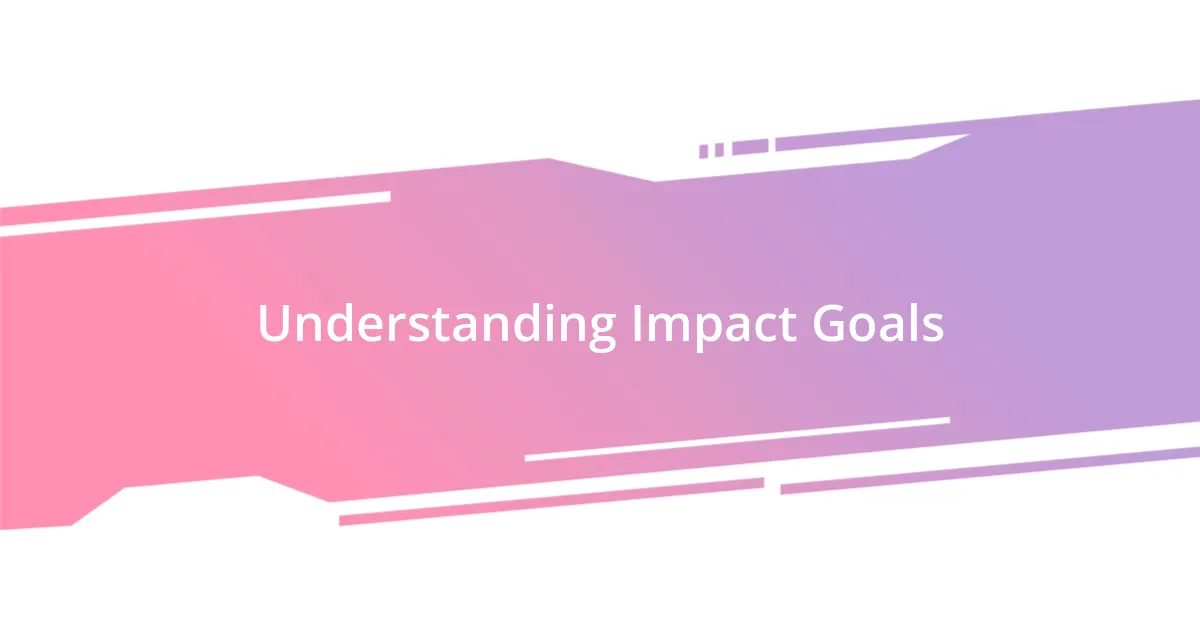
Understanding Impact Goals
Understanding impact goals goes beyond simply setting targets. It’s about identifying what truly matters to you and how you aim to influence the world around you. I remember when I first articulated my own impact goals; it was an eye-opening experience that forced me to reflect deeply on my values and what legacy I wanted to create.
Have you ever paused to think about the bigger picture of your aspirations? For me, that moment came when I realized that my passion for environmental sustainability could shape my career choices. Defining my impact goals helped me align my actions with my beliefs, making each decision feel more meaningful and purposeful.
It’s fascinating how setting these goals can shift your perspective. I once felt overwhelmed by the myriad of choices in my life. However, once I articulated my impact goals, everything began to fall into place. Suddenly, I found clarity in my purpose, and it empowered me to take bold steps toward achieving a more significant positive impact.
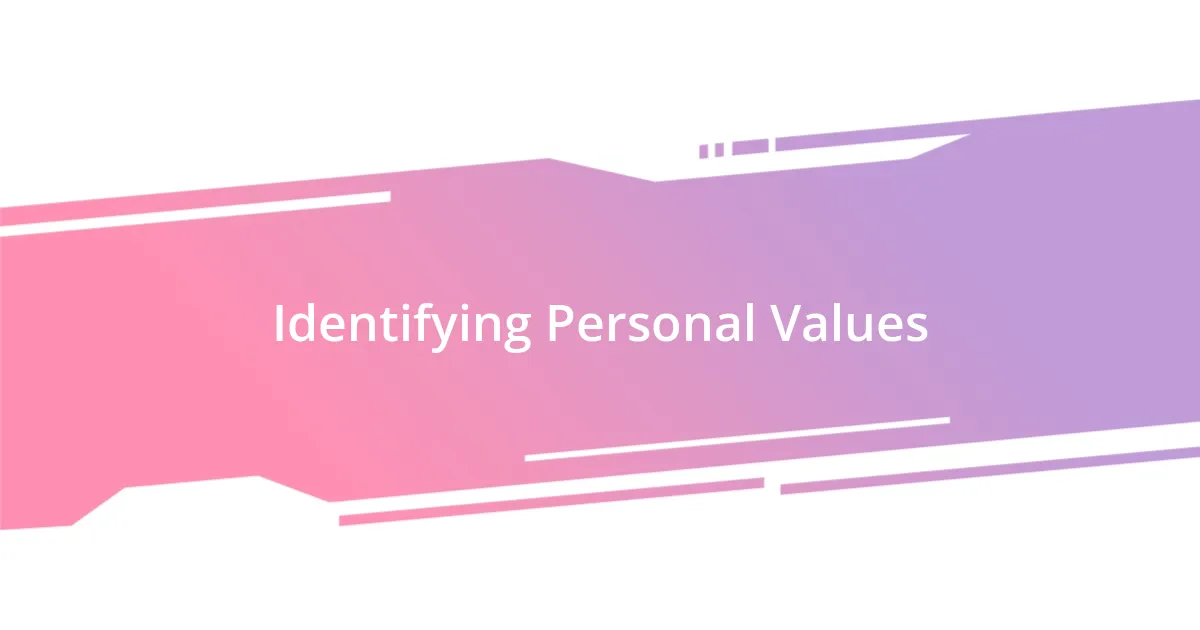
Identifying Personal Values
Identifying personal values can feel like peeling an onion; each layer reveals more about who you truly are. I recall sitting quietly in my living room, jotting down what mattered most to me, and it was both exhilarating and humbling. Through this exercise, I discovered that honesty, creativity, and community topped my list, guiding virtually every decision I make.
To assist in uncovering your own values, consider reflecting on these aspects:
- Moments of Joy: What activities consistently bring you happiness?
- Influential Figures: Who inspires you, and what traits do they embody?
- Past Pains: What situations have you faced that deeply affected you, and why?
- Legacy: What do you want to be remembered for after you’re gone?
- Unwavering Beliefs: What principles do you refuse to compromise, no matter the circumstance?
Engaging with these questions can lead you closer to the core values that resonate within you. I often return to my value list when I feel lost or uncertain; it serves as a compass guiding me back to my authentic self.
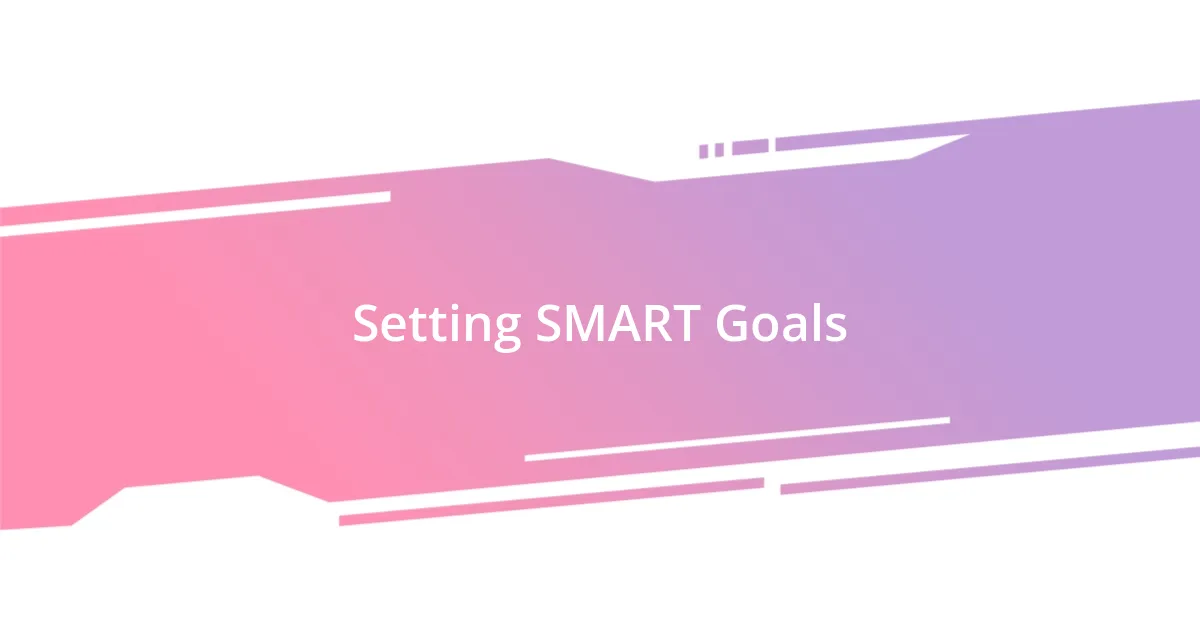
Setting SMART Goals
Setting SMART goals is an effective way to refine my impact objectives. By using this framework, I ensure my goals are Specific, Measurable, Achievable, Relevant, and Time-bound. For example, instead of saying, “I want to improve my community,” I might say, “I will organize a community clean-up event in three months to gather at least 50 volunteers.” This clarity provides a roadmap, making it easier to take actionable steps.
One time, I had a vague goal of wanting to “be more involved” in local environmental initiatives. However, once I applied the SMART criteria, I realized I could set a specific goal of “attending one local environmental meeting each month for the next year.” This shift not only made the goal more attainable but also kept me engaged and accountable throughout the process. Ask yourself: How can making your goals SMART bring you closer to your aspirations?
When I think back to my journey, setting SMART goals felt like upgrading from a map to a GPS. It transformed the way I approached my ambitions; every goal became a beacon guiding my actions. Crafting these goals isn’t just about planning; it’s about manifesting a clearer vision of my impact, which empowers me to create real change in my world.
| SMART Criteria | Description |
|---|---|
| Specific | Define the goal clearly and specifically. |
| Measurable | Establish criteria to track progress. |
| Achievable | Ensure that the goal is attainable. |
| Relevant | Align the goal with your values and larger objectives. |
| Time-bound | Set a clear deadline for achieving the goal. |
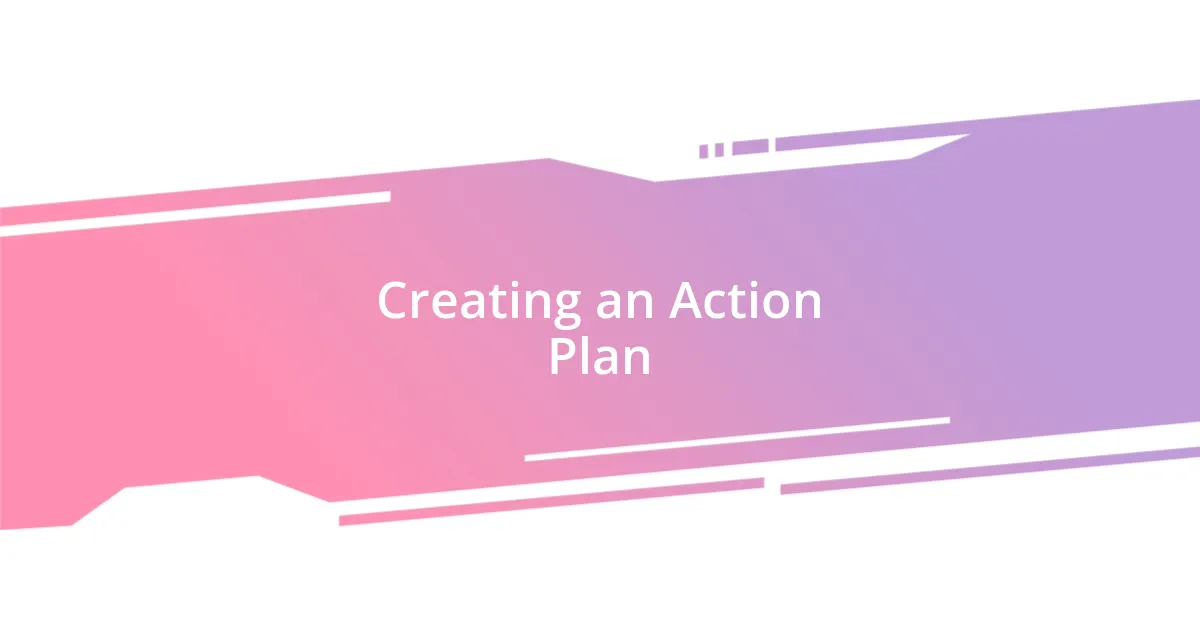
Creating an Action Plan
Creating an action plan is where the magic truly begins. I’ve learned that breaking down my SMART goals into smaller, manageable tasks can turn a daunting objective into something completely achievable. For instance, when I aimed to start a community book club, I didn’t just list “organize it” as a task. I divided it into steps: selecting a venue, choosing the first book, and promoting it on social media. This granular approach kept me motivated—I could celebrate tiny victories along the way, like securing a cozy space for our first meeting.
When I’m crafting my action plan, I always ask myself, “What resources do I need?” Identifying tools or support systems has been critical to my success. I once faced a setback while trying to launch a charity drive; it felt overwhelming until I reached out to friends for help. Their enthusiasm and skills not only lightened my load but also enriched the experience. It’s amazing how a little collaboration can amplify your impact.
Documents and checklists play a role in my planning too. I often create a visual timeline that illustrates when each task should be completed. This not only keeps me accountable but also helps visualize my journey toward the end goal. Have you ever felt the thrill of ticking off tasks? I definitely have! For me, seeing a series of checkboxes filled is like watching pieces of a puzzle click into place, propelling me ever closer to making a meaningful impact.
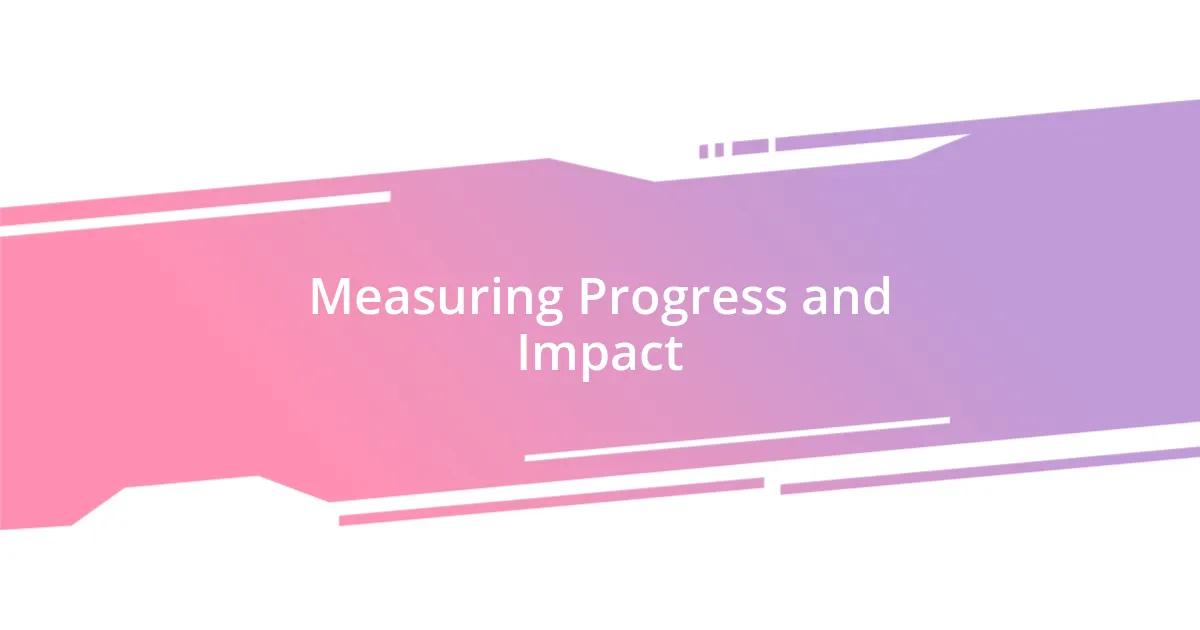
Measuring Progress and Impact
Tracking my progress toward my impact goals is an essential part of my journey. I often find myself reflecting on whether I’m moving in the right direction. For instance, when I set the goal of improving local recycling efforts, I established milestones, such as collecting specific data on waste reduction every month. Each time I reviewed those figures, I felt a sense of accomplishment, even if the numbers weren’t perfect yet.
I remember a time when I organized a fundraising event for a local charity, and during the planning process, I kept a detailed log of ticket sales and donations. As I updated the numbers, it struck me how motivating it was to see tangible results. It wasn’t just about the total amount raised; it was about witnessing the growing support from my community. This made me ask myself: how often do we celebrate the little wins that pave the way for greater achievements?
To ensure my impact measurement is effective, I also rely on feedback from those involved. After completing a project, I like to gather reactions and thoughts from participants. Once, after leading a workshop on sustainable living, I received incredibly thoughtful feedback that influenced my subsequent projects. It reminded me that measuring impact isn’t just a numbers game; it’s about understanding perceptions and the stories behind the data. How do you capture the narrative of your impact? That narrative often reveals as much as the metrics themselves.
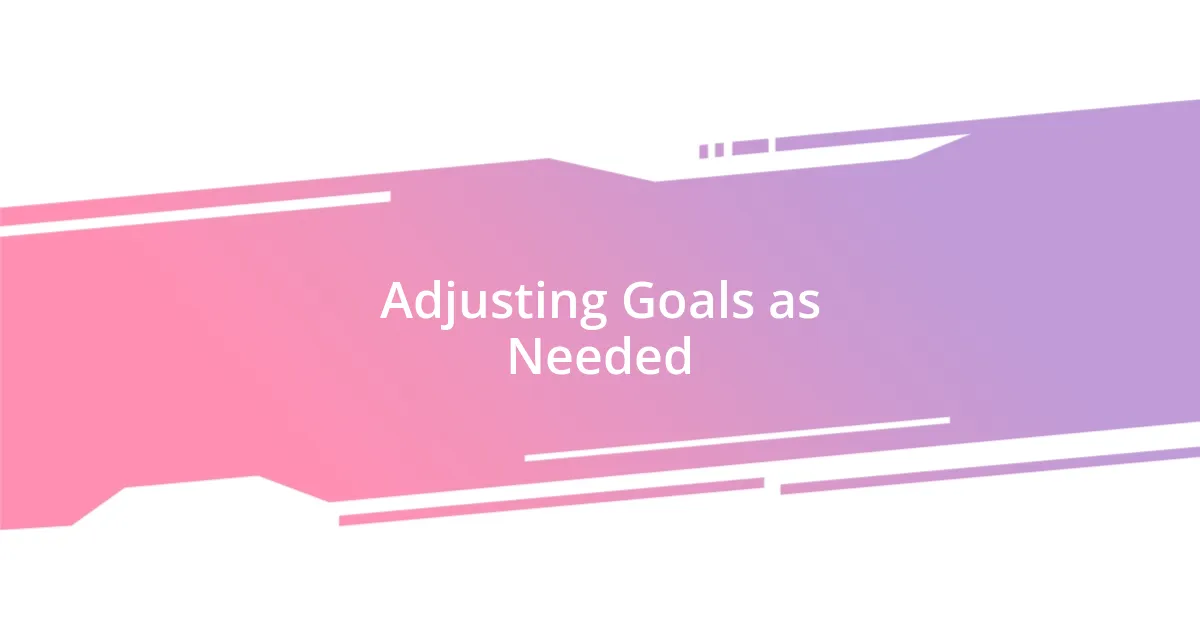
Adjusting Goals as Needed
When my circumstances shifted, I learned the importance of being flexible with my goals. For instance, I had set out to create a mentorship program, but as I connected with potential mentors and mentees, it became clear that some of the original expectations needed tweaking. I took a moment to reassess what the community truly needed and adjusted the structure of the program accordingly. Have you ever felt the need to pivot your plans? It can feel daunting, but it often leads to greater impact.
I remember a time during the pandemic when my goal of hosting in-person workshops had to be abandoned. Instead of letting disappointment take over, I quickly adapted by transitioning to online formats. I discovered that not only did this broaden my reach, but it also allowed for more diverse participation. The experience taught me that when faced with obstacles, embracing changes can foster unexpected opportunities. Suddenly, I had participants joining from other cities, and their stories enhanced the learning environment in ways I hadn’t anticipated.
It’s essential to regularly check in with myself and my goals. I incorporate moments of reflection into my routine, where I honestly assess whether I’m still aligned with my initial vision or if it needs a refresh. Just last month, I revisited a goal related to community outreach after realizing my focus had shifted elsewhere. I found that reallocating my time toward this goal reignited my passion and allowed me to re-engage with my local community in a meaningful way. Do you take time to reflect? I believe those pauses can be the key to staying on track and ensuring our efforts resonate with our mission.
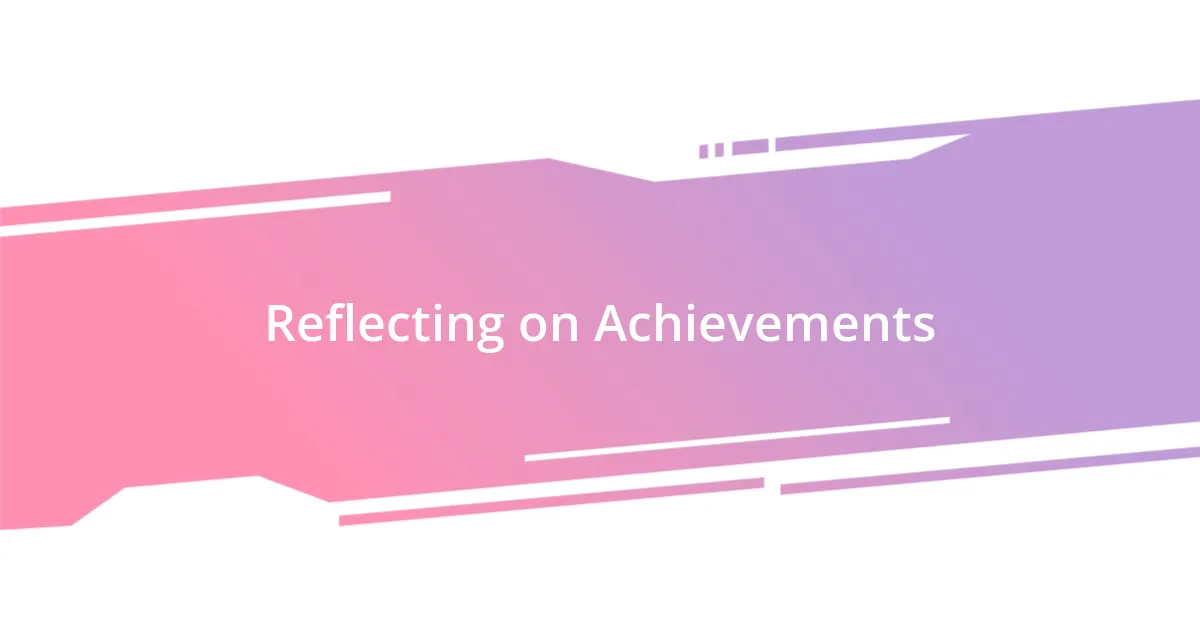
Reflecting on Achievements
Reflecting on my achievements is often a deeply personal experience. I recall the first time I led a community gardening initiative; it wasn’t just about planting seeds in the ground. Every time I saw families coming together, digging in the dirt, and sharing stories over their budding plants, I felt an overwhelming sense of pride. Those moments were the real victories for me—transforming a simple idea into a thriving community project. Have you ever stopped to appreciate the full impact of your efforts?
During my journey, I’ve learned to celebrate not just the big accomplishments but also the small wins along the way. When I successfully engaged local schools in environmental education through interactive sessions, I remember receiving handwritten thank-you notes from students. Those notes were like gold to me. They reflected the heartwarming connections made, and in turn, reminded me of the positive ripple effects that often go unnoticed. How often do we acknowledge the small gestures that fuel our passion? These reminders keep my motivation alive.
Sometimes, reflecting on achievements means grappling with unresolved challenges. I once organized a clean-up event that didn’t attract as many volunteers as I’d hoped. Initially, I felt disheartened. Yet, as I pondered the experience, I gained valuable insights into my outreach strategies and community engagement. It taught me that each attempt, even those that seem less successful, contributes to a broader understanding of my impact. Have you ever found wisdom in setbacks? Embracing those lessons has been crucial in shaping my future endeavors.

